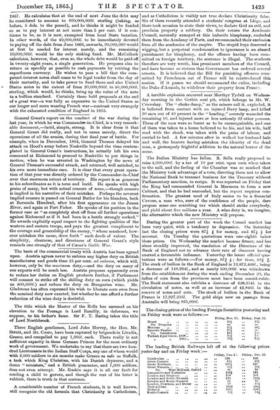General Grant's report on the conduct of the war during
the last year, in which he was Commander-in-Chief, is a very remark- able document,—lucid, simple, strong. It is clear from it that General Grant did really, and not in name merely, direct the operations of all the armies, during that final year of battle. For example, when in December, 1864, General Thomas delayed his attack on Hood's army before Nashville beyond the time contem- plated in General Grant's instructions, he actually left his own command at Richmond to proceed to Nashville to put things in motion, when he was arrested in Washington by the news of General Thomas's successful attack, and returned, well satisfied, to .his own more immediate care. It is clear that every great opera- tion of that year was directly ordered by the Commander-in-Chief over that enormous extent of territory. His report is as generous to his subordinates as it is terse and lucid. He speaks with high praise of many, but with actual censure of none,—though censure is implied in his narrative of their mistakes. Perhaps the severest implied censure is passed on General Butler for his blunders, both .at Bermuda Hundred, after his first appearance on the James River, and again at Fort Fisher. He speaks of his position in the dormer case as " as completely shut off from all further operations against Richmond as if it had been in a bottle strongly corked." He awards explicitly equal respect to the fighting qualities of the western and eastern troops, and pays the greatest compliment to the courage and generalship of the enemy, " whose manhood, how- ever mistaken the cause, drew forth " such deeds of valour. The simplicity, clearness, and directness of General Grant's style reminds one strongly of that of Caesar's Gallic War.


































 Previous page
Previous page